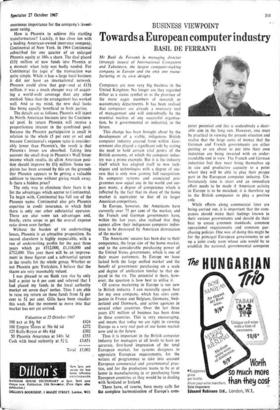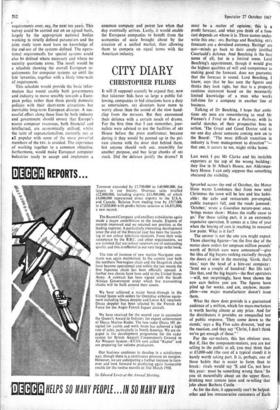Towards a European computer industry
BUSINESS VIEWPOINT BASIL DE FERRANTI
Mr Basil de Ferranti is managing director (strategic issues) of International Computers and Tabulators, the largest computer-making company in Europe and the only one manu- facturing to its own designs.
Computers are now very big business in the United Kingdom. No longer are they regarded
either as a status symbol or as the province of the more eager members of research or accountancy departments. It has been realised that computers are already a necessary tool of management and will undoubtedly be the essential nucleus of any successful organisa- tion, be it governmental or industrial, in the future.
This change has been brought about by the development of a viable, indigenous British computer industry created from within. Gov- ernment also played a significant role by stating the need to hold certain vital points of the British economy, of which the computer indus- try was a prime example. But it is the industry itself which has adapted itself to new tech- niques and technologies with a degree of suc- cess that is only now gaining full recognition. Its computer systems and associated pro- grammes now equal any in the world and sur- pass many, a degree of competence which is reflected by the fact that its share of the home market is equivalent to that of its larger American competitors.
In Europe, however, the Americans have currently over 75 per cent of the market, and the French and German governments have, within the last year, also realised that they cannot allow their indigenous computer indus- tries to be destroyed by American domination of the market.
The Americans' success has been due to their competence, the large size of the home market, and to the considerable purchasing power of the United States government, which is one of their major customers. In Europe we have lacked both the large unified market and the benefit of government purchasing on a scale and degree of unification similar to that en- joyed in the us. The potential is there, how- ever; the question is how best to utilise it.
Of course marketing in Europe is not new to British industry. I can naturally speak best for my own company, which has sales com- panies in France and Belgium, Germany, Swit- zerland and Denmark, and active agencies in several other countries. Over the last three years £31 million of business has been done in these countries. This is very encouraging, and means that today we are right in viewing Europe as a very real part of our home market now and in the future.
Thus it is important in the British computer industry for managers at all levels to have an accurate, first-hand impression of the total European market, for systems designers to appreciate European requirements, for the writers of programmes to take into account European commercial and governmental prac- tice, and for the production teams to be as at home in manufacturing in or purchasing from European countries as they would be in dealing with Scotland or Ireland.
There have, of course, been many calls for the complete harmonisation of Europe's com-
puter potential and this is undoubtedy a desir- able aim in the long run. However, one must be practical in viewing the present situation and realise that the large sums of money that the German and French governments are either putting or are about to put into their own industries are being invested with an under- standable end in view. The French and German industries feel they must bring themselves up in size and productive capacity to a point where they will be able to play their proper part in the European computer industry. Un- fortunately time is short and an immediate effort needs to be made if American activity in Europe is to be matched: it is therefore up to the British companies to play a positive role.
While efforts along commercial lines are being carried out, it is important that the com- panies should make their feelings known to their various governments and should do their best to create common standards, common operational requirements and common pur- chasing policies. One way of doing this might be for the principal European governments to set up a joint study team whose aim would be to establish the national, governmental computer
requirements over, say, the next ten years. This survey could be carried out on an agreed basis, largely by the appropriate national bodies working to strictly defined parameters and the joint study team need have no knowledge of the end-use of the systems defined. The opera- tional requirements for special systems could also be defined where necessary and where no security questions arose. The result would be a schedule showing the overall European re- quirements for computer systems up until the late 'seventies, together with a likely time-scale of requirement.
This schedule would provide the basic infor- mation that would enable both governments and industry to move sensibly towards a Euro- pean policy rather than those purely domestic policies with their short-term attractions but inevitable long-term European disaster. A suc- cessful effort along these lines by both industry and government should ensure that Europe's scarce computer resources, both financial and intellectual, are economically utilised, whilst the taint of supranationalism, currently not at all popular with some of the more pos%ertul members of the EEC, is avoided. The experience of working together to a common objective, furthermore, would make European computer Industries ready to accept and implement a
common company and patent law when that day eventually arrives. Lastly, it would enable the European companies to benefit from the economies of scale brought about by the creation of a unified market, thus allowing them to compete on equal terms with the American industry.











































 Previous page
Previous page